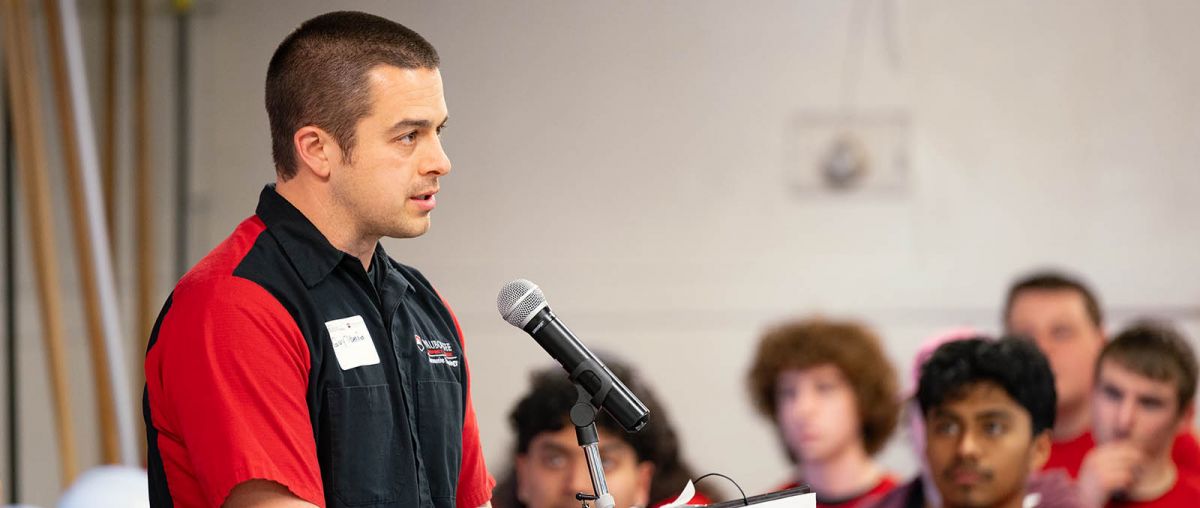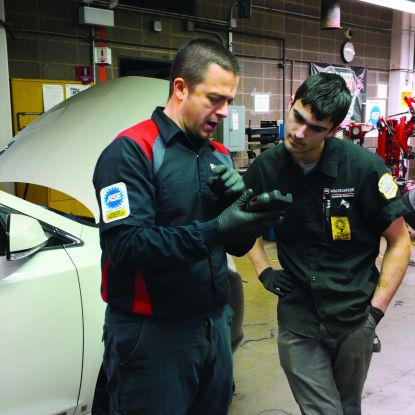

The biggest advantage at Waubonsee is the live work. Our shop is set up like a real shop. We work on real cars with real problems.
What classes do you teach?
Like most instructors in our automotive program, I teach eight different classes, ranging from engine, mechanical, and power train classes to advanced driveability, fuel controls and engine controls. I span all areas of the car with what I teach, depending on the day or the semester. It is very challenging developing preps and finding enough live work for each class. But it also keeps us actively involved and familiar with all the new technology.
What is your favorite class to teach?
Engines. That's kind of my specialty, specifically in race cars. So I bring a lot of the high performance aspect into the class, which obviously students are interested in. And then my advanced driveability classes where we use advanced diagnostic tools like the PicoScope. I found a lot of really cool creative ways to use the PicoScope to diagnose really strange problems on cars and students are interested in using that tool and figuring out different ways to incorporate it.
How would you describe your teaching style and what can students expect in class with you?
My teaching style is more of the "let's learn something together," not just me standing up in front of you and telling you what you need to know, but learning about things that interest you and how you can use your specific talents to succeed in this field. I like working with students one on one or in smaller groups. I do like to make it as fun as possible because we're with our students for six hours a day, four days a week. So they have to really enjoy being here and they have to really buy into what we have in the program to get out everything out of it that they need to.
What should students know about studying Auto Tech at Waubonsee?
Very few programs do live work at all, and I don't know any other school where the entire curriculum is live work. Our shop is set up like a real shop. We work on real cars with real problems--cars that have a lot of miles on them, rust, all the same things they're going to encounter in the field. Students hone their skills here, so when they get out in the field they're not learning on the job and making those initial mistakes. They're making them here, where we can teach them the right way to do things. So I think the biggest advantage at Waubonsee is the live work, because it gives our students an experience that most other schools can't provide.
How did you become interested in the Auto Tech Field?
My father was a mechanic working on cars when I was growing up, and he taught me a lot of basic mechanical repairs: tools, how to fix things, how to build things. When I was in high school, I came to Waubonsee for a field trip to the Automotive Open House, and that's where I met Ken Kunz. I came to Waubonsee as a freshman right out of high school and fell in love with the program, fell in love with the work. Then Ken started talking to me about becoming a teacher. I got my bachelor's degree at Southern Illinois University, and then started teaching right out of college.
What do you like to do outside of work?
I build performance vehicles, so I do it out of my garage at home. I like the fun of figuring out how to make something that performs, but is aesthetically pleasing enough to where the owner could bring it to car shows and people can enjoy and appreciate the work and the craftsmanship that went into it.
Do you have a favorite car?
I don't necessarily have a favorite, but I guess if I had to pick one, it would probably be the Corvette. I work on a lot of them outside of Waubonsee. I specialize in late model GM electronic fuel injection cars and the Corvette is probably one of the more popular ones. They're fun to drive.
What are you most looking forward to in the Technical Education Center?
The TEC is going to benefit our students in many different ways. I think the main benefit is more room for work. We're going to have more students who are completing the job on their own and getting the full experience. We're also getting a lot of new equipment to keep up with technology. This field moves incredibly fast. That building will have the newest, latest, greatest stuff to make sure that for the next few years we're ahead of the curve. Our industry partners are recommending what they're using in the field and what they see as a need, so our students will be up to speed.

